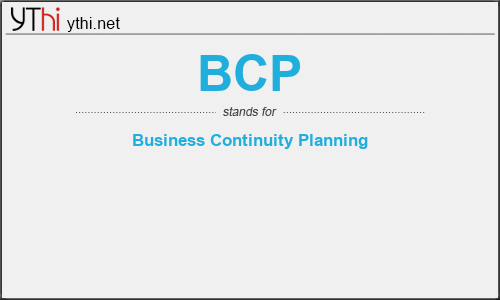What does BCP mean? What is the full form of BCP?
The full form of BCP is Business Continuity Planning.
Business continuity planning (BCP) is the process involved in creating a system of prevention and recovery from potential threats to a company. The plan ensures that personnel and assets are protected and are able to function quickly in the event of a disaster. The BCP is generally conceived in advance and involves input from key stakeholders and personnel.
When business is disrupted, it can cost money. Lost revenues plus extra expenses means reduced profits. Insurance does not cover all costs and cannot replace customers that defect to the competition. A business continuity plan to continue business is essential. Development of a business continuity plan includes four steps:
- Conduct a business impact analysis to identify time-sensitive or critical business functions and processes and the resources that support them.
- Identify, document, and implement to recover critical business functions and processes.
- Organize a business continuity team and compile a business continuity plan to manage a business disruption.
- Conduct training for the business continuity team and testing and exercises to evaluate recovery strategies and the plan.
Information technology (IT) includes many components such as networks, servers, desktop and laptop computers and wireless devices. The ability to run both office productivity and enterprise software is critical. Therefore, recovery strategies for information technology should be developed so technology can be restored in time to meet the needs of the business. Manual workarounds should be part of the IT plan so business can continue while computer systems are being restored.
Business continuity (BC) refers to maintaining business functions or quickly resuming them in the event of a major disruption, whether caused by a fire, flood or malicious attack by cybercriminals. A business continuity plan outlines procedures and instructions an organization must follow in the face of such disasters; it covers business processes, assets, human resources, business partners and more.
BCP
means
Business Continuity Planning![]()
Translate Business Continuity Planning to other language.


Leave a Reply
You must be logged in to post a comment.